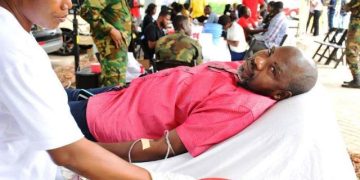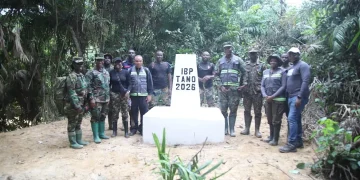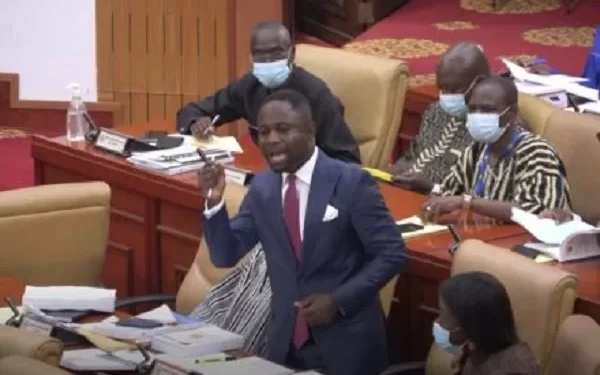Minister for Health, Hon. Kwabena Mintah Akandoh, has assured Parliament that the government is implementing a multi-sectoral strategy to combat the ongoing cholera outbreak, which has so far claimed 49 lives across five regions.
Addressing Parliament on Tuesday, the Juaboso MP disclosed that out of 6,145 reported cases, 719 have been confirmed. However, he noted that cases are on the decline, with the outbreak now concentrated in the Central Region.
The Minister emphasized the urgent need for a coordinated effort to address the underlying causes of cholera, including poor sanitation, inadequate access to clean water, and unsafe food handling practices.
Cholera Outbreak: A Regional Breakdown
Hon. Akandoh provided a detailed account of the outbreak, which began in October 2024 in Ada West, Greater Accra, before spreading to four other regions: Central, Western, Ashanti, and Eastern.
“As of February 13, 2025, we have recorded 6,145 cases, with 719 confirmed and, unfortunately, 49 deaths,” he informed Parliament.
Despite the severity of the outbreak, the Minister noted that new cases are decreasing, particularly in previously hard-hit districts such as Agona West and Effutu in the Central Region. As of February 16, only 28 active cases remained in the region, distributed as follows:
- Effutu – 18 cases
- Cape Coast – 6 cases
- Agona West – 4 cases
“This positive trend is a testament to the relentless efforts of our healthcare workers and partners, who have been implementing a robust response plan,” the Minister stated.
Government’s Response to Cholera Outbreak
The health Minister outlined several key interventions undertaken by the Ministry of Health and its partners to control the outbreak:
- Coordination – Regional and District Public Health Emergency Committees have been activated to ensure an organized response.
- Enhanced Surveillance – Community case searches and contact tracing are being conducted to swiftly identify and manage cases.
- Laboratory Strengthening – Efforts have been made to improve laboratory capacity for accurate diagnosis.
- Environmental Assessments – Risk factors such as poor sanitation and unsafe water sources have been identified and addressed in affected districts.
- Case Management – Cholera treatment centers have been set up, and healthcare workers trained on proper management of cases.
- Public Awareness Campaigns – Community engagement initiatives have been launched to educate people on cholera prevention.
- Vaccination Campaigns – Oral cholera vaccines (OCV) have been deployed in high-risk areas.
The Minister revealed that a two-phase oral cholera vaccination campaign had been completed in five districts across the Central and Western regions, with 92.9% of the target population vaccinated. Similar efforts have been approved for Accra Metro, with 257,370 people already vaccinated, while approval for Agona West has been secured, and an application for Effutu is pending.
Challenges and the Need for Long-Term Solutions
Despite the progress made, Hon. Akandoh acknowledged that Ghana still faces challenges in controlling cholera, including poor sanitation and limited access to clean water.
“Cholera persists in our country because of unsafe water sources, open defecation, and unhygienic food handling. We need a long-term, multi-sectoral approach to permanently eliminate these conditions,” he stressed.
The Minister called on local authorities to intensify enforcement of sanitation by-laws and urged the media to amplify public education efforts.
Meningitis and Other Disease Outbreaks
In addition to cholera, Hon. Akandoh briefed Parliament on an ongoing meningitis outbreak in the Upper West Region, where 129 cases and 16 deaths have been recorded. He noted that meningitis outbreaks in Ghana typically occur during the dry season, from October to March.
To contain the outbreak, the government has deployed medical experts, ensured free treatment for affected individuals, mobilized essential antibiotics, and launched intensive public awareness campaigns.
The Minister also disclosed that a single case of Human Metapneumovirus (HMPV), a respiratory illness, had been detected in Ghana. However, he assured Parliament that the risk to the public remains low.
Concluding his statement, Akandoh reiterated the government’s commitment to containing these outbreaks and safeguarding public health.
“I urge all Members of Parliament to support local authorities and health workers in educating our citizens on disease prevention. Early reporting of symptoms and adherence to hygiene practices are crucial in controlling these outbreaks,” he said.
He reassured the nation that the Ministry of Health would continue to monitor the situation and provide regular updates.
As Ghana battles these health crises, stakeholders are calling for sustainable investments in sanitation, water safety, and healthcare infrastructure to prevent future outbreaks.

































































